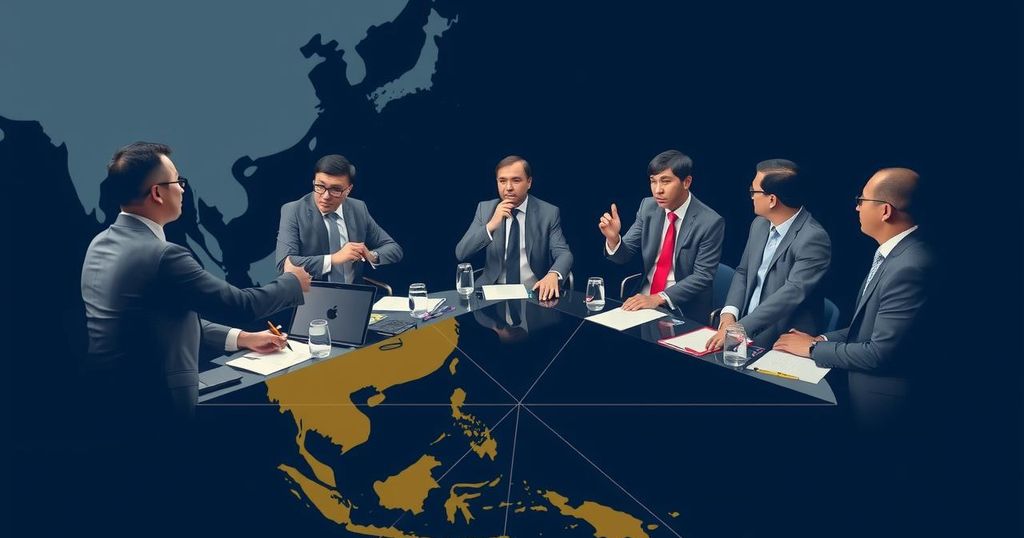Heritage Foundation Advocates for Enhanced U.S. Engagement in Pacific Island Nations Against Chinese Influence

The Heritage Foundation has released a report urging the United States to maintain strong engagement with Pacific Island nations to counter Chinese influence, highlighting its significance for national security. While there is broad support for increased involvement, concerns are also raised about addressing other pressing regional issues.
The Heritage Foundation, a conservative think tank, has recently advocated for the continuation of United States engagement with Pacific Island nations, emphasizing its significance regardless of the outcome of the upcoming presidential election. This call for sustained involvement comes amidst increasing competition between Washington and Beijing in the Pacific territory, situated between Hawaii and Australia. In a comprehensive 45-page report authored by Andrew Harding, a research assistant at the Heritage Foundation’s Asian Studies Center, a compelling case is made for taxpayers and policymakers alike to recognize investment in these island nations as strategically beneficial. Harding posits that such investments would counter Chinese ambitions, thereby preventing Beijing from establishing a presence that could pose threats to U.S. national security and hinder future military operations in Asia. The report resonates with various members of the Republican Party who see the Pacific Islands as critical terrain in balancing power against China. Alexander Velez-Green, a former national security advisor, described the report as “a compelling vision” and highlighted the islands’ strategic importance in America’s geopolitical strategy. Furthermore, the former Asia advisor under the Trump administration, Alexander Gray, suggested that this report will influence the actions of the next president, regardless of party affiliation, noting that a potential second Trump administration would likely build upon these strategies. While many former Trump officials are now associated with the Heritage Foundation, critics highlight that the report’s focus on Chinese interference merely scratches the surface of the challenges faced by the Pacific Islands. John Hennessey-Niland, former U.S. ambassador to Palau, pointed out that while concerns regarding China are significant, other issues such as climate change and local governance capacities also warrant attention. Similarly, Kathryn Paik, a senior fellow at the Center for Strategic and International Studies, argued that framing U.S.-Pacific relations solely in terms of China overlooks the deeper connections of history, culture, and shared values. Harding defended the foundation’s position, asserting that the competition with China remains the primary impetus for U.S. engagement in the Pacific. He further pointed out that while Chinese President Xi Jinping has actively engaged with leaders from the Pacific Islands, the Biden administration has only held joint meetings with these leaders, failing to foster individual relationships. Despite differing opinions on the report’s strategy, many of its 31 policy recommendations, such as the appointment of a special envoy for the Pacific Islands, are viewed as having bipartisan support. Greg Brown, a senior analyst, emphasized the necessity of a skilled envoy who can effectively advocate for U.S. interests in the region. However, he also noted the challenge of securing congressional funding, as many Americans are unaware of the strategic importance of the Pacific Islands. In summary, the Heritage Foundation’s report urges a reinvigorated U.S. presence in the Pacific Islands to counteract China’s growing influence. While there is an understanding of the importance of this engagement, broader issues facing these nations also need to be addressed.
The report from the Heritage Foundation emerges against a backdrop of intensifying strategic competition between the United States and China in the Pacific region. The Pacific Islands, strategically located between Hawaii and Australia, have become a focal point for diplomatic and military interests. This growing competition has prompted a call for the U.S. to enhance its engagement with these nations to counter Chinese influence, ensure national security, and address regional concerns that transcend mere geopolitical rivalry. Key figures in American foreign policy, including former advisers and analysts, have weighed in on the implications of these strategies, reflecting a range of opinions on how best to approach the unique challenges faced by these island nations.
The Heritage Foundation’s advocacy for continued U.S. engagement with Pacific Island nations underscores the strategic importance of this region in the context of U.S.-China competition. While the report presents a strong case for heightened diplomatic and financial involvement, it also raises critical questions about addressing broader issues faced by these nations, such as climate change and local governance. With bipartisan support for many of its recommendations, the challenge remains to effectively communicate the strategic significance of these islands to the American public and Congress.
Original Source: www.voanews.com






